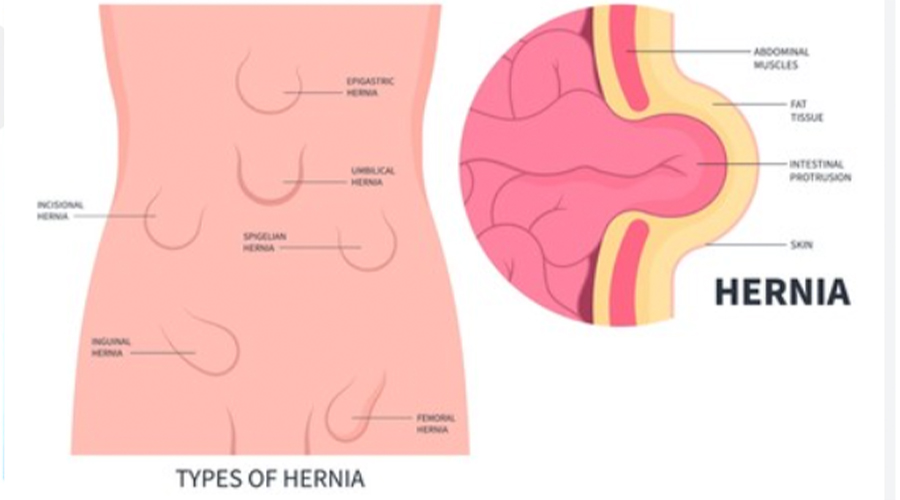A Hernia occurs when the contents inside the abdomen breaches the enclosing abdominal wall through a defect and manifests as a swelling in that area of the
abdominal wall. There are many types of hernia, and when the hernia occurs in the inguinal area, its called an inguinal hernia.

An Inguinal Hernia occurs when abdominal contents (omentum or part of intestine protrudes through a defect in the abdominal muscles in the inguinal region. It
appears as a bulge in the groin area, especially on standing/coughing.

This bulge may be totally without any pain/discomfort or may be painful, specially when you cough or lift a heavyweight or stand for long. An Inguinal Hernia is not necessarily dangerous by itself. However it does not get better ,or go away on its own. It can get bigger and occasionally cause serous life threatening complications.
An Inguinal Hernia cannot be treated by medicines and your surgeon may advice surgery to cure it.
How do I know that I have an Inguinal Hernia?
You will notice or feel a bulge in your groin/inguinal area on standing/coughing.
When you lie down flat on your back, the swelling may disappear.
Types of Inguinal Hernia?: Indirect Inguinal Hernia and direct Inguinal Hernia. It is difficult to differentiate between the two by clinical examination by a doctor, and
even by routine ultrasound scan. No difference in treatment plan between the two. It is mentioned only because indirect Inguinal Hernia is commoner in young people
and there is a theory that it may be.
Reducible/irreducible or incarcerated Inguinal Hernia/strangulated Inguinal Hernia.
Reducible Inguinal Hernia: The bulge disappears on lying down or at most disappears with gentle pressure with hand. Most Inguinal Hernias are reducible.
Irreducible/incarcerated Inguinal Hernia: The bulge does not disappear on lying down and also cannot be made to disappear by pressure with hand. The situation needs urgent surgery.
Strangulated Inguinal Hernia:
Hernia is irreducible and there is pain.
This is because there is compromise with the blood supply of the contents.
This is a life threatening complications and needs immediate surgery.
Causes of Inguinal Hernia:
Exact cause is not known in most cases, however some theories are there.
(a). Inguinal Hernia is more common in male.
(b). During development the tests is inside the abdomen and then comes out to lie in scrotum. It pulls along with it a fold of abdominal membrane called tunica vaginalis which then disappears. At times this, tunica vaginalis persists and causes an indirect Inguinal Hernia.
(c).Smoking predisposes to development of hernias.

(d). If a person has had an inguinal hernia on one side, there is high probability of developing an inguinal hernia on the opposite side.
(e). Having a job that involves standing for long periods of time, or heavy physical labour, increases the chances of developing an inguinal hernia.
(f). Chronic cough especially as in asthmatics can predispose to developing an inguinal hernia.

(g).Excessive weight can predispose to hernia.
(h).Having a job that requires standing for long periods or doing heavy physical labour increases your risk of developing an Inguinal Hernia.